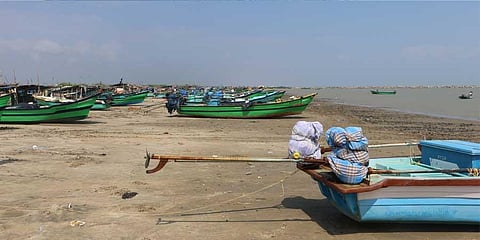

THOOTHUKUDI: After a short ban, the state fisheries department has begun issuing licences for chank diving activities in Thoothukudi, offering a scope for the workers in the conch industry. However, country boat fishermen have raised ante against the move stating that it will result in contempt of court, as the use of compressors and jet pumps for diving are yet to prohibited by authorities concerned.
The renewal of chank diving licences was put to a halt from March 31 after the Madurai Bench of the Madras High Court ruled against the carrying out the activity inside the core regions of the Gulf of Mannar Marine National Park. It may be noted that the chank diving practice, which has been prevalent along the pearl fishery coast since the Sangam era, involves divers collecting chanks and conch shells lying under the seabed off the Thoothukudi coast up to 25 nautical miles from the shore in the Gulf of Mannar.
According to country craft fishermen, who oppose the move, the use of compressors and jet pumps for chank diving is detrimental for human health and marine life. "The inhalation of contaminated air from compressors result in early deaths among the divers, besides the use of jet pumps endangers the marine ecosystem as it could wipe out benthic organisms. At least 25 divers die due to health ailments every year," said Dr Gayes, president of Thoothukudi and Tirunelveli country boat fishermen welfare association.
Terming the application of jet pumps for collecting conch shells as unacceptable, Tamilar Munnetra Kazhagam Katchi state general secretary Raja said, "Corals are living beings and the breeding ground of fishes. The force of the spray can dismantle the corals and dislodge them. One should realise that the underwater marine ecosystem, once destroyed can not be restored." He further demanded a blanket ban on the industry.
On the flip side, Meerasa, a Sangukuli trader association leader, opined that a ban on chank diving would impact the livelihood of nearly 5,000 families in the district. "The country craft fishermen started opposing chank diving as the industry swelled up and turned more profitable than fishing. Since divers earn nearly Rs 2,000 per day, many fishermen started shifting to chank diving activity considering its lucrative reasons," he said.
It may be noted that the Fisheries Assistant Director had prohibited the use of artificial equipment like compressors for breathing while chank diving on June 9, 2011. However, the Sangukuli workers association managed to obtain a stay order to continue their activity, stating that the equipment was a life saving kit, until March 2024.
Stating that the Gulf of Mannar Marine National Park is a protected area, the Madras High Court, in its order dated February 22, directed the Assistant Director of Fisheries to mention the area limits for fishing and diving for chank shells, and issue licences by adhering to Tamil Nadu Chank Fisheries Rules, 1981.
"Chank divers mainly die due to heart attack. When they work under seawater, their blood pressure soars and the liver expands. They are supposed to take rest for at least for a day after work, without engaging in heavy work to maintain good health. But many repeatedly go for work giving least significance to health," notes a health professional.
Speaking to TNIE, a senior official from the fisheries department said that the licence was issued for collecting conches by prohibiting the activity at the Gulf of Mannar islands. However, there is no ban on compressor and jet pumps, since it was not discussed in the court orders, the official said.
Gayes argued that the court had ordered to adhere to Tamil Nadu Chank Fisheries Rules, 1981 which never accepted the use of advanced equipment that could harm marine ecosystem. Issuance of licence without banning compressors and jet pumps will lead to contempt of court orders, he said.
Another official added that the fisheries department had proposed to provide scuba equipment along with oxygen cylinders for the divers at 75 percent subsidy, in order to replace the compressors and jet pumps.